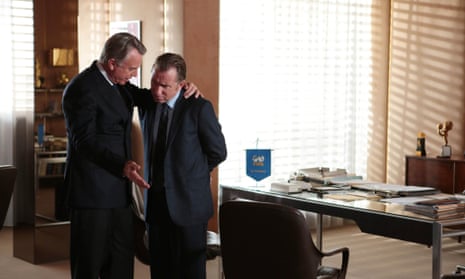So where did Fifa’s money go ? Considering that the film United Passions was principally bankrolled by the now-shamed sports organisation, it isn’t unfair to say some of the dough must have ended up in the pockets of Tim Roth, Gérard Depardieu, Sam Neill and Fischer Stevens.
You could argue and say they’re only actors, and actors like to work, but they surely read the screenplay before they signed on. Even without the current headlines, United Passions is a disgrace. It’s less a movie than preposterous self-hagiography, more appropriate for Scientology or the Rev Sun Myung Moon. As cinema it is excrement. As proof of corporate insanity it is a valuable case study.
Bereft of a conventional three-act narrative, United Passions opens with images of happy children of multiple races cheerily playing football in a non-specific but very salt-of-the-earth location. This is all for them, the movie will remind us, time and again. Which makes the ensuing two hours of self-congratulation all the more baffling. The first chapter settles in on characters like Carl Hirschmann (Stevens) and Robert Guérin (Serge Hazanavicius) signing the documents to create Fifa with the gravitas of curing cancer. “Being president of Fifa will bring no glory, no money!” warns Hazanavicius, in one of a dozen lines that comes off like a howler considering the current news. But the group has a key problem. Those snobby Brits, the inventors of the beautiful game, refuse to join the assembled Frenchmen, Spaniards, Danes and Germans.
Cut to two decades later and the beleaguered league has a new face in Jules Rimet (Dépardieu, a good enough actor that he almost makes this laughable film tolerable). Rimet interrupts speeches lauding the Olympics (“this is an outrage!” say onlookers in top hats and monocles, as they are wont to do in movies written on autopilot), suggesting that only his group is the true barometer of football greatness. Even though Fifa is still an upstart, it inspires investment from Latin American millionaires and the creation of the World Cup.
“He’s mad!” “No, he’s a visionary!” is actual dialogue used to discuss Rimet as all work toward the 1930 World Cup in Montevideo. When the match finally comes together, we encounter a problem – there’s still two-thirds of this movie left, and absolutely no dramatic arc. It lumbers along, checking in on games and boardroom meetings, showing different soccer stadiums around the world and how Rimet knelt down in prayer during the second world war in the hopes that it would eventually go away. (It did!) Then we come to a curious episode in 1950.
Listen, I’m an American. I still find it hard to believe that anyone other than the mothers of 13-year-olds watch soccer, er football. Point is, I didn’t know who won the 1950 World Cup until I watched this film, which, I fully realise to the rest of the world is like saying “I didn’t know you could mix peanut butter and jelly!” But the Maracanazo, as the Uruguay upset over Brazil is called, is presented in United Passions like a greater tragedy than the whole of the second world war. And how is that in any way fair to the hardworking Uruguayans, who won the game? Won’t anyone speak for Uruguay? I guess their cheque to Fifa hadn’t cleared when this script was being written.
Time marches on, and so does the Fifa presidency. After Rimet comes João Havelange (Sam Neill), presented as a master of realpolitik. There are implications of corruption under his regime, but he was wise and warm-hearted enough to recognise that Latin America, Asia and Africa were the future of soccer. “We’ve done more for black people than all the UN resolutions!” he bellows, without a hint of irony. He also makes a key hire: Switzerland’s Sepp Blatter (Tim Roth). Welcoming Blatter to his first boardroom meeting Havelange wryly notes “he is apparently good at finding money”.
The stretch of the film in which we’re to groove on “Blatter doin’ work” is, and I swear I’m not making this up, a series of meetings in which he lands big-ticket sponsorship deals. The camera dwells lovingly on a trunk full of Adidas products. The big “we did it” is a phone call Blatter makes to Havelange (in his private pool overlooking the ocean), announcing interest from Coca-Cola. None of this is done through a Mad Men-like lens. This is pure corporate pamphleteering. The final act concerns virtuous Blatter winning a re-election despite having “enemies” elsewhere on the board. Did I say corporate pamphleteering? More like Stalinist propaganda.
This would all be a goof if the ripple effects from Fifa weren’t so severe (the deaths in Qatar make this no laughing matter). Blatter and the other Fifa execs will have their day in court, but United Passions’ very existence is a strong bit of evidence of just how rotten and delusional this organisation became. Had the arrests in Switzerland not happened, this wretched movie would have disappeared without trace. Now it is something to scrutinise – and learn from.
